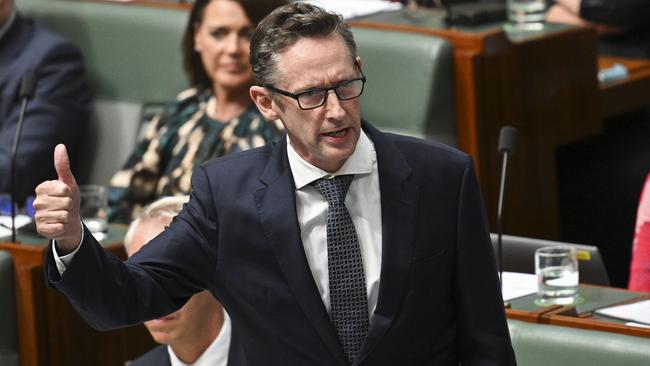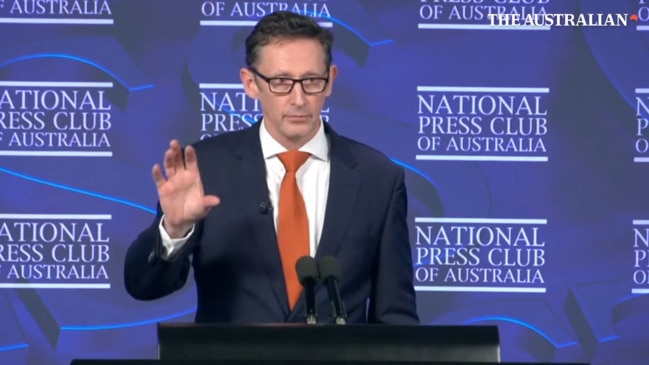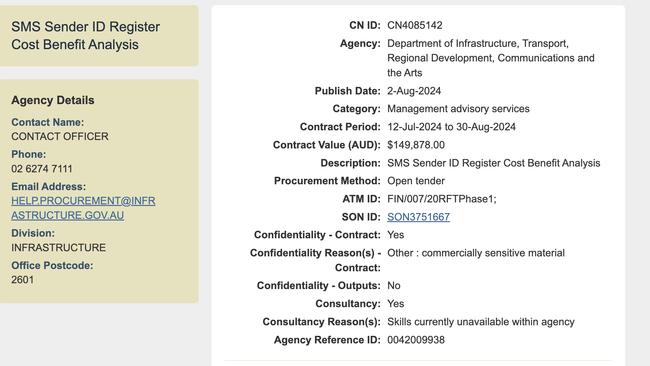Deloitte awarded $150k contract to guide a decision the Albanese government has already made
Why was Deloitte awarded $150k to examine cost versus benefits of a new SMS sender ID register to head off scammers already deemed mandatory?

The federal government is “wasting taxpayer dollars” spending $150,000 on a “big four” consultant to guide a decision that it has already made to stop scam text messages, one of the nation’s biggest telcos says.
The Department of Infrastructure, Transport, Regional Development, Communications and the Arts has written to telcos asking them for their feedback on a cost-benefit analysis about whether to make a new SMS sender ID registry mandatory or voluntary.
This is despite Assistant Treasurer Stephen Jones last month telling the National Press Club the initiative, introduced to parliament earlier this year, would be compulsory.
But two days after Mr Jones appeared at the Press Club, the department published a tender notice, stating it had awarded Deloitte Access Economics a contract worth almost $150,000 to complete the analysis.
In a letter sent to telcos, the department said the analysis would guide the government’s decision about whether to make the register mandatory or voluntary, saying that the bill introduced to parliament this year did not specify what form it would take.
Australia’s biggest telco Telstra has “encouraged” a cost-benefit analysis but rival TPG said it was a waste of money, as the government had already made its decision.
“Instead of wasting time and taxpayer dollars on pointless reviews and cost-benefit analysis, we need to fast track a mandatory SMS sender registry to slam the gate shut on scammers,” TPG spokesman Mitchell Bingemann said.
“TPG Telecom has long advocated for an industry regulated SMS origin tag whitelist. It is a simple solution to significantly reduce spam traffic, but it must be mandatory.
“A voluntary code will create more holes for scammers to exploit while allowing unscrupulous operators to put their commercial needs over public safety.

“Every day we delay, society pays the price while scammers reap the benefits. It’s time to stop the analysis paralysis and take decisive action to protect Australians.”
Government departments’ use of consultants this year has come under intense scrutiny and was the subject of a Senate committee inquiry, after a string of scandals and poor behaviour by consultancies. This led to many contracts with PwC being rescinded.
But in the past 12 months, Deloitte has been awarded 175 government contracts worth almost $205m, according to commonwealth tender documents.
The SMS register aims to disrupt text message scams before they reach Australians by confirming the sender’s identity. Other countries have introduced similar initiatives but have taken different approaches. For instance the UK opted for a voluntary register while Singapore’s is mandatory.
“It’s a game of whack-a-mole,” Mr Jones told the National Press Club. “It’s working but not as effective as it needs to be, so the next step will be establishing an SMS ID register so that if a scammer does try to impersonate a bank or a telco, or a government agency or a famous brand, the message will be blocked if their number is not on the register.
“So to send out mass SMSs using a brand name, you will have to have your number on the register and the number and (if) the number doesn’t match the name, your call will be blocked. It’s a process operating in Singapore.
“In the UK it’s a voluntary system. Ours will be mandatory.”

Mr Jones said the government has spent more than $67m so far this year in “the war on scams”. He said this was against 601,000 Australians who reported losing $2.74bn to scams in 2023.
He said the “centrepiece” of its fight was legislating a scams code framework and “new mandatory industry codes”.
“When we came into government, Australians were among the most lucrative targets in the world for scammers. The goal of the Albanese government is to reverse that,” Mr Jones said.
“We will make Australia one of the hardest targets in the world for scammers. Because we want Australians to earn more and keep more of what they earn. And that means keeping their money safe.”
Telcos are split on what form the register should take. Optus and TPG believe it should be mandatory to ensure it is effective, while Telstra has backed a cost-benefit analysis to also look at the voluntary option.
“We’ve participated in early trials of a Sender ID registry to help combat instances of SMS scams. We remain supportive of the introduction of a Sender ID registry but encourage a detailed assessment of the costs versus benefits of a mandatory registry as is consistent with any proposed regulatory change,” a Telstra spokesman said.
“We’re committed to continuing to work with ACMA (Australian Communications and Media Authority) to participate in further discussions including the cost benefit analysis.”



